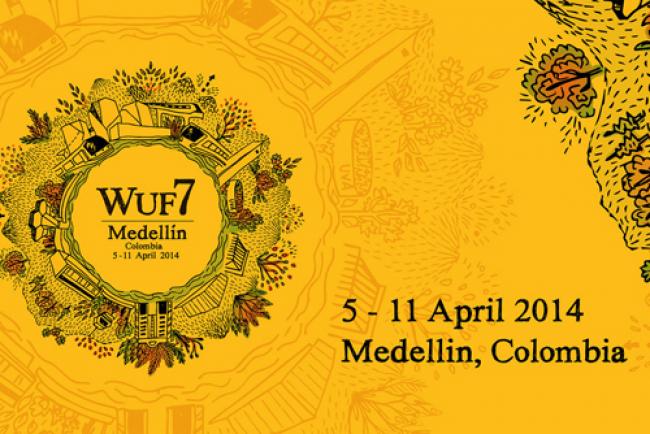Civil Society
WUF: UN hails cities as vital to sustainable development
12 Apr 2014, 07:38 am Print

New York, Apr 12 (JEN): "A city is not just an accident, but the result of coherent vision and aims,” stated Leon Crier, pioneer architect, urban planner and visionary, as he spoke to participants at a discussion on Urban Equity in development – Cities for Life organized by the United Nations Human Settlements Programme (Habitat).
Crier, considered the Godfather of the “New Urbanism” movement, was joined by luminaries like Nobel Laureate Joseph Stiglitz and former New York City Mayor, Michael Bloomberg, who was recently appointed as UN Special Envoy for Cities and Climate Change, in Medellin, Colombia, as the seventh session of the World Urban Forum (WUF7) got under way on Friday, 5 April.
The Colombian city of Medellin, which has recently undergone remarkable transformation, provided what, participants agreed, was the fitting backdrop for these important discussions.
Held every two years, the Forum is a key event for the international community that brings together a wide range of participants from around the world to discuss key urban challenges facing the world today.
It is estimated that two-thirds of the world's urban population live in cities where income inequality has increased since the 1980s. In many cases, this increase has been staggering. Among the topics tabled for discussion were youth and human rights, indigenous peoples and cities, gender equality and safety in urban contexts.
The WUF7 aimed to feed into the preparations for the Third United Nations Conference on Housing and Sustainable Urban Development (Habitat III). Key principles of equitable growth and shared prosperity are central to what Habitat is trying to pursue in urban growth and life. This will represent an opportunity to integrate equity in the development discourse, ensuring that urbanization becomes a positive force for all present and future generations of the world‘s cities.
Joseph Stiglitz, named by TIME magazine in 2011 as one of the 100 most influential people in the world spoke to the Forumon Tuesday arguing that urban planning has to address inequality. He stressed that "a poor environment contributes to poor health and poor health contributes to poor economic performance”.
“Cities that have pursued GDP [gross domestic product] have often not delivered in terms of improved standards of living. They end up highly congested and one interesting thing is that when you do studies of what people enjoy or they don’t enjoy at the very bottom of the list of things they find most unpleasant is time spent commuting, specially time spent commuting in a congested environment,” according to the economist.
Public transportation is key, Stiglitz said. Other elements of the agenda include affordable housing, good education for all, access to medication and access to fresh food.
Also speaking at the event was Anne-Marie Leroy, Senior Vice-President and General Counsel for the World Bank Group. Stating that cities generate more than 80 per cent of the world’s GDP, she also said that we have to build organized cities with balanced public spaces and public utilities for all.
“You must get your policy right first. Law is a tool that will help you achieve equitable cities, for instance, setting rights through public services and enforce those rights and help people to have them enforced, Leroy continued.
Inequality tends also to be associated with higher feelings of alienation, higher crime rates, Leroy added. She said that law shapes our cities, the land use, the institutions and the finance. Law governing public meetings, open records, budgeting, accounting and reporting helps ensure that the business of the public is done in public.
In multiple sessions that addressed a wide spectrum of issues related to urbanization and development, speakers emphasised the relevance of planning for spaces in cities and properly distributing such planning, in order to achieve social integration. This, they concluded, could be realised through planned city extensions and urban revitalization.
As participants worked their way to the closing session and a “Medellin Declaration”, the rallying call for the forum has been, 'the cities we want.' In an interview with UN Radio, Dr. Joan Clos, Executive Director of UN-Habitat, said urban planning should be democratic and involve all parts of the community.
The seventh session of the World Urban Forum ended on Friday in the city of Medellin, Colombia, where nearly 15,000 participants from around the globe have been gathering to chart the way for better cities, whose development takes into account the needs of everyone .
World Urban Forum: 5 - 11 April 2014, Medellin, Colombia. Photo: UN habitat
More Civil Society
- Antony Blinken discusses assassination attempt on Prime Minister with Iraqi President Barham Salih
- Civilians ‘must not be a target’, urges UNHCR, following military escalation in northern Syria
- A third of young people polled by UN, report being a victim of online bullying
- Christian protest forces Israeli Museum to remove controversial Ronald McDonald statue
- Restoring government control across Central African Republic is ‘key’ to lasting peace, stability – UN envoy



-1763561110.jpg)


